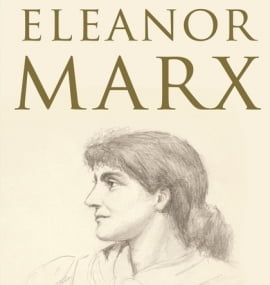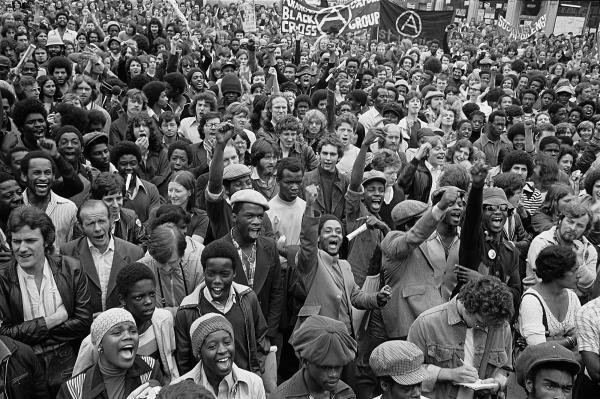Eleanor Marx, daughter of the greatest political scientist in history, faced the formidable task of living up to her family name in the turbulent period during the birth of the organised labour movement in Britain. Ben Gliniecki reviews Rachel Holmes’ new biography Eleanor Marx – A Life, which impressively describes and analyses Eleanor’s achievements over her lifetime.
Eleanor Marx, daughter of the greatest political scientist in history, faced the formidable task of living up to her family name in the turbulent period during the birth of the organised labour movement in Britain. What she managed to achieve in this period, under the influence of her father’s ideas, makes Rachel Holmes’ new biography Eleanor Marx – A Life, an appropriately impressive project.
[Purchase a copy of Eleanor Marx – A Life through WellRed Books]
Revolutionary theory and the revolutionary movement
Eleanor, who gathered and prepared the writings by Marx that became the classic pamphlet Value, Price and Profit, had a brilliant grasp of Marx’s economic theories. Holmes explains that the formative years of Eleanor’s childhood coincided with Marx’s research and writing of Capital. Eleanor and Capital grew up together in a very literal sense, with Marx translating his economic theories into childlike stories with which to entertain Eleanor.
This is a crucial point that explains Eleanor’s determined political activism and committed socialist principles in later life. As Lenin stated, “without revolutionary theory there can be no revolutionary movement” – it would be hard to imagine a more thorough grounding in Marxist theory than Eleanor’s and this manifested itself in her leading positions in the gas workers’ union and her advisory, fundraising and international liaison work for both the TUC and other unions throughout her life. Without Eleanor’s understanding of Marxist theory, she could not have played the important political role that she did.
Eleanor’s Marxist upbringing gave her the theoretical knowledge necessary to play key role in the labour movement throughout her life. Eleanor played a leading role in trade unions struggling for their rights. She tirelessly agitated amongst workers all over the country, speaking at an endless series of public lectures, meetings and open air rallies. Eleanor’s spectacular dedication to spreading the ideas of socialism demonstrates her unwavering commitment to the proletarian struggle and a firm understanding of the principles of Marxism.
The background to the struggles of the period is well explained in the biography and, with a couple of minor exceptions, Eleanor’s role in events is not over-exaggerated, suggesting that the author of the biography, as well as its subject, has a good grasp of historical materialism.
The wealth of information in the biography about the development of the labour movement in this period is also a very valuable reminder of the pivotal role that Marxism played in the origins of organised labour in Britain. It was thanks to the work and ideas of committed Marxists that the British labour movement took shape – a fact that today’s trade union leaders, saturated as they are with the politics of class collaboration, compromise and capitulation, would do well to remember.
Internationalism
A point that, quite correctly, is constantly emphasised throughout the biography is Eleanor’s commitment to internationalism. In her political struggles she was frequently battling the national chauvinists in the movement who would, 16 years after her death, capitulate to nationalism upon the outbreak of World War One.
This a reflection of her personal life, filled as it was with friends and comrades from all over the world, and Eleanor’s own ability to speak a great many languages. Based on her political upbringing, this demonstrates the incontrovertible internationalist nature of socialism.
Not for nothing did Marx and Engels conclude The Communist Manifesto with the words “Workers of all countries unite” – capitalism’s global nature means that socialism is international or it is nothing. This point is clearly made in the biography and, although not necessarily very explicitly, it makes clear that narrow nationalism and the Stalinist policy of ‘socialism in one country’ has nothing in common with Marxism.
Contradictions under capitalism: love and art
Holmes’ biography reads as a demonstration of the contradictions of capitalism explained by Marx being lived out by his daughter. Eleanor, heavily influenced by Engels’ ideas about the origins of the family, spent most of her life in a relationship with the science instructor, amateur actor and Left intellectual, Edward Aveling. Their troubled relationship expresses the dominance of the ideology and culture of the ruling class in any particular period.
Aveling was legally married to another woman for much of his relationship with Eleanor which he blatantly treated as an open one. Needless to say this domestic arrangement offended the hypocritical sensibilities of polite society at the time. Despite her advanced ideas about the nature of marriage and the relations between the sexes, the contradiction between Eleanor’s political ideas and the expectations of conservative bourgeois society made her deeply unhappy. She was subject to bouts of depression caused by Aveling’s caddish behaviour, and the contradictions reached their conclusion with Eleanor’s death upon finding out that Aveling had secretly remarried despite his promise to marry Eleanor as soon as he was free to do so.
Holmes is sceptical of the coroner’s verdict that Eleanor committed suicide, suggesting that Aveling was not only morally but also legally responsible for her death. Either way, Holmes’ account proves Marx’s historical materialism by showing the crippling nature of the contradictions between the socialist aim of equal relations between the sexes and the impossibility of the existence of such relations under capitalism.
Eleanor was ahead of her time in more ways than just on the question of relations between men and women. Karl Marx was an avid Shakespeare enthusiast and Eleanor inherited his fondness for literature and theatre which she linked firmly to her political perspectives, evidenced by her lectures on the socialist ideas of the poet Shelley. Eleanor devoted much of her time to educating workers on aspects of art and culture, as Holmes writes: “Eleanor’s precepts on art were clear. Everybody was entitled to enjoy good quality, challenging culture and entertainment”. Thus she put on extremely popular lecture series and ‘Art evenings’ at which poetry and literature readings were given and theatrical pieces were performed for working class people.
In Socialism: Utopian and Scientific Engels speaks of the socialist revolution as being “the ascent of man from the kingdom of necessity to the kingdom of freedom”. In other words, socialism opens up the possibility of living our lives as we choose to, not as is dictated to us by forces beyond our control. Such a world would free people from the drudgery of wage-labour and precipitate a flowering of, among other things, art and culture by freeing up people’s time to spend however they wish. Although this cannot be achieved within the confines of capitalism, Eleanor could see the seeds of this future society present in her own world and worked to nurture that potential as far as possible.
Her efforts to raise the cultural, and therefore political level of the workers finds their clearest manifestation in the help Eleanor gave to Will Thorne, whose near illiteracy when he first joined the movement as Marxist trade unionist had been turned around by Eleanor, a fact that contributed at least in part to Thorne’s election to be the first general secretary of the National Union of Gasworkers and General Workers (with Eleanor also on the executive). Despite the difficulties associated with educating people locked into long hours and poor conditions by capitalism, conditions Eleanor herself suffered, Holmes shows how Eleanor saw political and cultural education as inextricably intertwined.
Feminism
There is one crucial area of the life and work of Eleanor Marx in which this biography is not as clear as it could be – the question of Eleanor’s feminism. Although the description of Eleanor and Aveling’s pamphlet The Woman Question is fairly good, at certain points in this chapter Eleanor’s views are unfairly portrayed as nothing more than those of bourgeois feminism. For example, Holmes says that Eleanor believed that “women should be forming a united feminist front, challenging across class divisions the divide and rule that regulates production and reproduction” (p.261) and further on “Edward and Eleanor’s landmark essay makes it absolutely clear that the struggle for women’s emancipation and the equality of the sexes is a prerequisite for any effective form of progressive social revolution” (p.262).
These statements are not an accurate representation of Eleanor’s views on the question, and they are even contradicted by the quotations from Eleanor’s pamphlet later in the chapter. The fault for this misrepresentation does not necessarily lie entirely with Holmes because there are a couple of clumsy formulations in the pamphlet which, taken out of context, could be interpreted as advocating nothing more than bourgeois feminism. For example, Eleanor writes in that pamphlet “both the oppressed classes, women and the immediate producers, must understand that their emancipation will come from themselves”. This formulation could be taken to suggest that Eleanor considers women as a whole to constitute a class, whereas Marxists would point out that class relations are determined by our relationship to the means of production, not by gender.
It is also worth noting that, written in 1886, this pamphlet describes the position of women as it was in Britain then, i.e. in a much worse state than is the case today. The demand for the democratic rights of women potentially had a much greater revolutionary content at that time than it would do today. As such Holmes may be attributing Eleanor’s democratic demands to the bourgeois feminist ideology of today, rather than to the genuine revolutionary ideology that incorporated them at the time.
Taken as a whole, the pamphlet clearly advocates revolutionary socialism, not bourgeois feminism. In other words Eleanor is not an advocate of a united front of women from all classes – she argues for proletarian revolution and the forcible overthrow of the bourgeoisie, including bourgeois women. She also makes clear that, far from equality of the sexes being a necessary prerequisite of revolution, that equality will actually only become possible in theprocess and aftermath of a revolution. This attitude is summed up by the following passage from Eleanor’s pamphlet:
“the first step [towards the emancipation of women] is the expropriation of all private property in land and in all other means of production. With this would happen the abolition of the State as it now is. No confusion as to our aims is more common than that which leads woolly thinking people to imagine that the changes we desire can be brought about, and the conditions subsequent upon them can exist, under a State regime such as that of today.”
It is unfortunate that the biography is not clearer in its explanation of Eleanor’s revolutionary socialist position on the women’s question. The incorrect implication that Eleanor was an advocate of bourgeois feminism blunts the revolutionary edge of her ideas and allows bourgeois feminists to claim her legacy as their own, when in reality Eleanor’s achievements were thanks to her Marxist ideas and not those of feminism.
Jacqueline Rose, a post-modernist, feminist academic at Queen Mary, University of London, has said of the biography that it “restores Marx to her proper status as one of the founding figures of twentieth-century revolutionary and feminist thought”. In reality, Eleanor’s work was simply a continuation of the work of her father and Engels, not the foundation of a bourgeois feminist school of thought. This is an important political point that requires clarification so as not to do a disservice to Eleanor’s revolutionary Marxist politics.
Lessons for today
Holmes makes use of the biography’s afterword to draw lessons from Eleanor’s life and work that are relevant to today’s world. She points out the attacks on working people and the poor that are taking place today and says “it’s almost as if we have convinced ourselves that inequality, consumerism and global commodity capitalism are a naturally inbuilt economic system to which there is no viable alternative”. Unfortunately Holmes stops short of following in Eleanor’s footsteps and making the case for socialism, but her appraisal and understanding of Marx’s ideas, at least broadly speaking, leaves the reader with some hope that she would not be unsympathetic to the revolutionary struggle for socialism.
This is a biography that does justice to the remarkable life of Karl Marx’s youngest and most politically active daughter. The information and lessons that it holds will be of great interest to Marxists today.






